Bibi’s ideas are not new. Israel as the Jewish state, Jerusalem as the eternal capital of Israel and the Palestinian abandonment of the right of return have been the top priorities of successive Israeli governments. The only difference between the mainstream left and right in Israel lies in the growth of settlements. The One-State Solution supported by Benny Elon of National Union Party has never been popular. Benny Elon calls for formal annexation of Judea and Samaria. Palestinian residents in West Bank then become citizens of Jordan.
But why have the Two-State Solution and One-State Solution negotiations failed? In his book, One State, Two State, Benny Morris chronicles peace negotiations between Jerusalem and Ramallah and predicts the future of the relationship between Israel and Palestine.
Morris is professor of history at Ben-Gurion University in Israel. Before entering academia, Morris worked as a journalist for the Jerusalem Post. Once considered a left-wing historian, Morris has largely been seen a member of the right-wing bloc since 2004. In an interview with Haaretz, Morris stated that the expulsion of Palestinians in 1948 was necessary to create a Jewish state. Morris also found fault with the country’s founder, David Ben-Gurion, for not expelling all Palestinians. The refugee issue, Morris suggested, could only be overcome through the “Iron-Wall” solution. It called for total Jewish domination of Palestine.

The problem with Morris’s thesis is his argument that democracy has never taken root in Palestine. Morris writes, “…Arab communities, are deeply religious and have no respect for democratic values and no tradition of democratic governance.” Morris’s view is inaccurate. Democracy exists in Palestine.
Palestinians had a free democratic presidential election in January 2005. The Palestinian Parliament also had a free election in 2007. The fact the United States, Israel, the European Union boycott Hamas should be interpreted as a sign against democracy in Palestine. The boycott should be perceived as a move to stop the rest of the world from contacting Hamas for future peace talks.
In fact, boycotting a political leader winning a general election is not a unique occurrence. When Jörg Haider won the Austrian election in 2000, the European Union stopped contacts with the new Austrian government for as long as Jörg Haider praised the Nazi Party and Hilter’s economic policies.
Equally disturbing is Morris’s pessimistic view on the future of Israel and Palestine. Morris explains his negative position on the possibility of co-existence between Israel and Palestine by describing all Palestinians as law-breakers. Worse, Morris justifies his baseless position using the crime and lethal car accident rates aming Israeli Arabs. Morris writes, “Arabs, to put it simply, proportionally commit far more crimes (and not only ones connected to property) and commit far more lethal traffic violations than do Jews.”
In what way does the crime rate among Arab Israelis represent Palestinians living in West Bank, Gaza and East Jerusalem? Can crime and car accident rates even be used in estimating the possibility that Palestinians may launch attacks against Jewish Israeli citizens once Palestine becomes a state? Morris’s explanation of why Israeli Jewish society cannot co-exist with Palestinian society makes him come off as irrational.
Morris does not utilize Arabic sources, further weakening his thesis. His book is full of English and Hebrew sources, and is therefore lopsided.
Morris does do a good job of analyzing the Palestinian National Chapter (PNC) and how it should be changed if the Palestinians are to recognize the Jewish State. For example, if Palestinian leaders agree to live in peace with Israel, they should eliminate the 22th clause of the PNC. The clause calls for “(destroying) the Zionist and imperialist presence…”
Morris is right to argue that the Palestinian authority cannot occupy two worlds, one of war and one of peace, if it wants to find some common ground with Israel.
While Morris may have a good reason for doubting Palestinian intentions, his views on democracy in Palestine and the future between Israel and Palestine are unnecessarily hopeless. Worse yet is the fact that Morris does not bother to provide a solid basis for his exaggerated claims.
